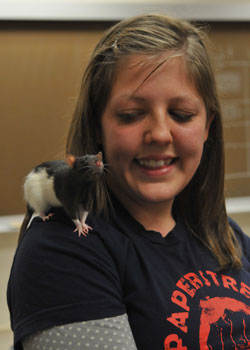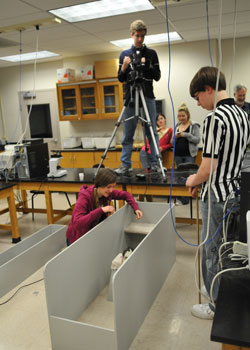

 |
|
 |
The 10 students in Dr. Danny Hitchcock′s Learning Theory class (Psychology 320) are in a rat race — literally. Applying the principle of operant conditioning, each student trained a rodent “athlete” to compete in Geneva College′s first-ever Rat Olimpicks.
“Operant conditioning is one way in which animals and humans learn,” says Hitchcock. “Simply put, it is learning the relationship between our behaviors and the consequences that follow. The goal of this event is to put theory into practice for the students; to get their book knowledge out there and see how it works itself out in everyday life.”
During the four weeks leading up to the olimpicks, trainers deprived their rats of small amounts of food, then motivated them to learn new behaviors by rewarding them with treats. The results were rats that flew through hurdles, took flying leaps from a complete stand-still, and vaulted a high-jump of almost two feet.
“You have to start small,” says psychology major Rebecca Jones. “You reward them if they're facing the right direction, if they hunch the right way to get ready to jump, if they make the right movement. Once they know what to do, they don't need the treat for that part of the behavior.”
Training their rats has also given Hitchcock′s students valuable insights into the ways people learn.
“Operant conditioning is the basis for a lot that happens in society,” Hitchcock explains. “Why do we go to our jobs? If we weren't getting paid, how many of us would show up every day? If there are rewards for behavior, people are more likely to do those things again.”
The class experimented with two different strains of rats — White Albino and Norwegian Hooded — to see which would perform the best. In the end, a hooded rat named Cookies took first place in the half hurdles (2.52 seconds); hooded rat Kiki placed first in the full hurdles (6.97 seconds); Cookies came back to win the long jump (25 inches); and two white rats named Molly and Daphne both took gold in the high jump (20 inches).
After analyzing the olimpick data, the class discovered that the only event that showed any statistical differences between strains was the long jump. The Norwegian Hooded rats, each jumping an average of 17 inches, were significantly better jumpers than the white rats, which jumped an average of only eight inches each.
Hitchcock enlisted the help of the campus and his family to make the rat olimpicks a full-fledged athletic event. The engineering department and physical plant helped students building the apparatus for each event, and the communications department enabled them to broadcast the action live from the rat lab to the auditorium in the Science & Engineering Building. Hitchcock′s sons Noah (11) and Jonah (9) sang the national anthem, and 14-year-old Calvin officiated, wearing an official referee′s jersey from Athletic Director Kim Gall. The olimpicks were sponsored in part by the student-run Psychology Club, which advertised the event and provided refreshments. The trainers and athletes in this year′s event were:
| Rats | Trainers | Cookies | Lillia Calvin | Kiki | Amy Hagen | Danielle | Katy Fleming | Stevie | Tiara Lucas | Sobe | Emily Tolvinski | Trixie | Ashley Baker | Duchess | Caitlin Rhone | Pearl | Amy Hagen | Molly | Rebecca Jones | Daphne | Anjelica Marsh |
The Psychology, Counseling and Human Services Department has two majors and a graduate program. The psychology major exposes students to theory and research in a variety of content areas including cognitive, behavioral, social, and developmental psychology. The curriculum is biblically integrated, and students are challenged to establish their own synthesis of the biblical with the theoretical. The human services major prepares and trains students to work in a variety of positions in social agencies. The curriculum is not only practical but also gives students the opportunity to consider social service theory and policy from a biblical worldview. The department houses a graduate program in counseling with three areas of study: school counseling, mental health and marriage and family.